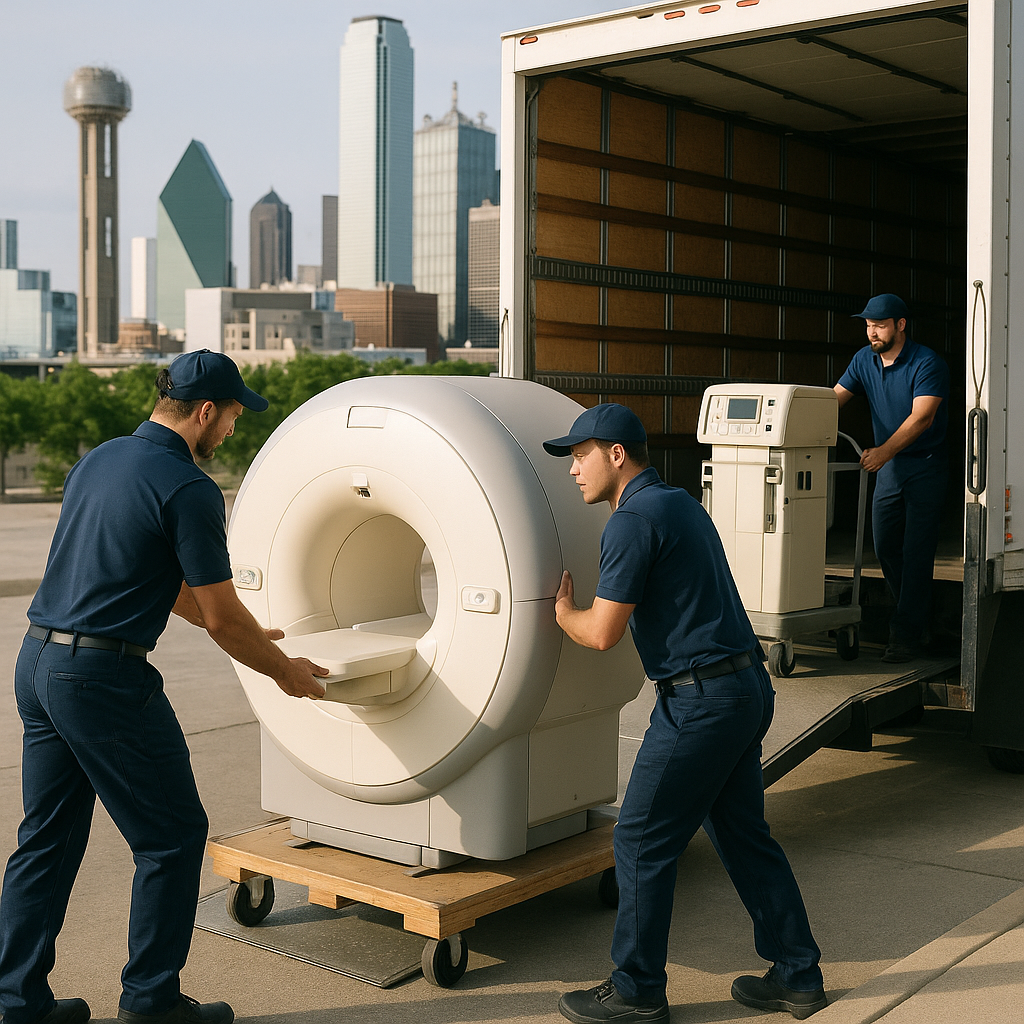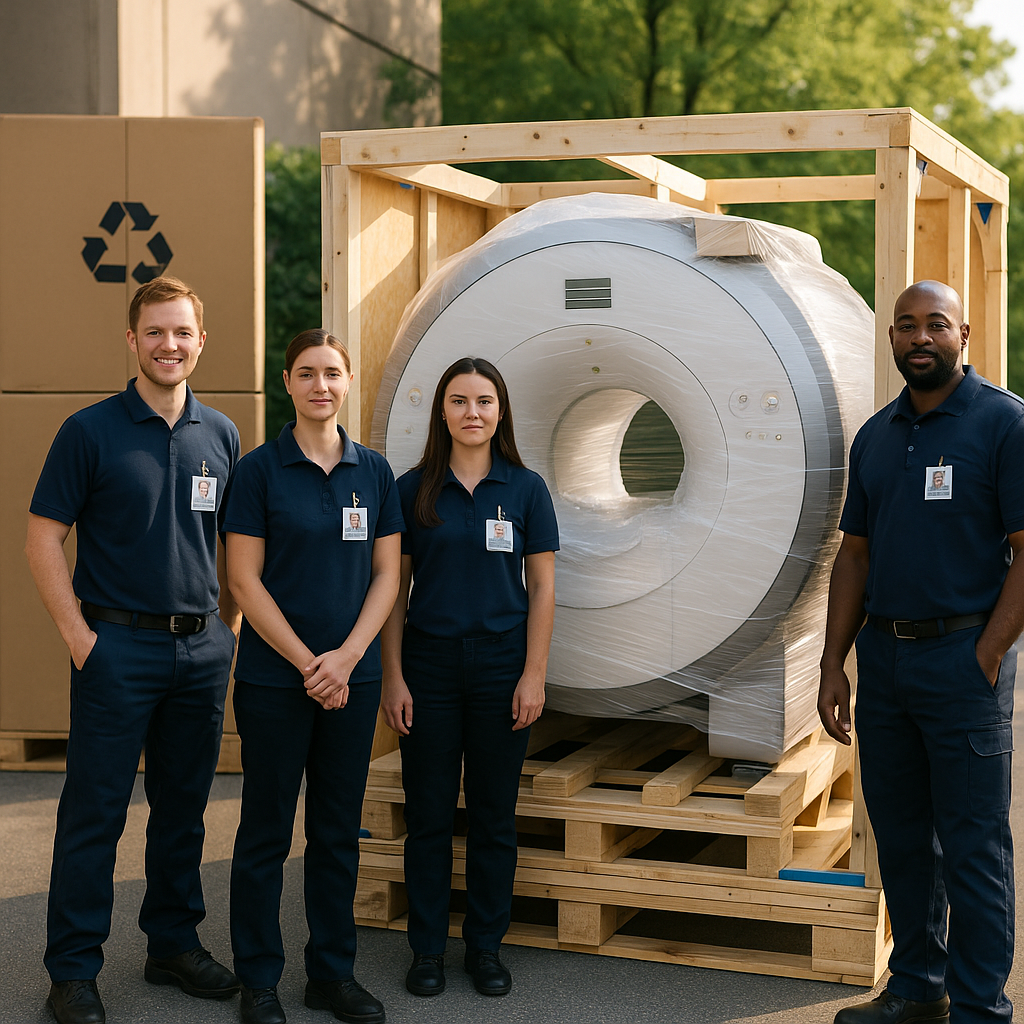5901 Botham Jean Blvd, Dallas, TX 75215
MRI Machine Removal Services in Dallas: A Guide to HIPAA & EPA Compliance
November 11, 2025Healthcare facilities across Dallas face a growing challenge when upgrading or decommissioning magnetic resonance imaging equipment. MRI machines contain hazardous materials, including mercury, beryllium, and liquid helium, which pose serious environmental and safety risks if not handled properly. These sophisticated devices also house powerful superconducting magnets that maintain magnetic fields even when powered down, creating potential projectile hazards during removal.
The complexity extends beyond physical safety concerns. Environmental regulations mandate specific disposal procedures for medical equipment containing toxic substances. Healthcare organizations must also ensure HIPAA compliance by securely destroying any data storage components within the imaging systems. Failing to meet these requirements can result in substantial penalties and environmental liability.
Professional MRI machine removal services in Dallas provide the specialized expertise needed to safely manage these regulatory complexities. We understand the technical requirements for decommissioning superconducting magnets, handling cryogenic materials, and ensuring complete data destruction. Our approach protects healthcare facilities from compliance violations while maximizing the recovery of valuable materials like copper, aluminum, and rare earth elements through responsible medical equipment recycling.
What Legal and Environmental Compliance is Required for MRI Disposal?
MRI disposal requires navigating two distinct regulatory frameworks that healthcare facilities must address. The complexity arises because these machines contain both sensitive patient data and hazardous materials, each regulated by different federal agencies with stringent enforcement measures.
HIPAA Data Security Requirements
Healthcare providers must protect patient health information throughout the disposal process. The Health Insurance Portability and Accountability Act mandates thorough data sanitization of all storage devices within MRI systems before decommissioning.
Simple deletion or formatting does not meet HIPAA standards for medical imaging equipment. We recommend the physical destruction of hard drives and storage components containing patient health information. This approach eliminates any possibility of data recovery and offers the strongest protection against potential breaches.
Environmental Protection Agency Regulations
MRI machines contain multiple hazardous materials regulated under environmental regulations. These devices typically include mercury, beryllium, and other toxic metals that pose significant environmental risks if improperly handled.
The powerful superconducting magnets require cryogen recovery to prevent helium coolant from releasing into the atmosphere. Additionally, the rare earth elements and specialized alloys used in magnet construction need careful extraction and processing to avoid soil and groundwater contamination.
Financial Consequences of Non-Compliance
The financial penalties for regulatory violations highlight the importance of proper compliance procedures. The EPA can impose penalties of up to $70,117 per day for hazardous waste regulation violations, accumulating daily until facilities achieve full compliance.
HIPAA breaches present equally serious financial risks, with violations resulting in fines ranging from $100 to $50,000 per violation. Healthcare facilities may face multiple violations from a single incident, compounding their financial liability.
Beyond monetary penalties, regulatory violations can trigger intensive audits, operational disruptions, and significant reputational damage. Insurance coverage may not protect against fines, leaving organizations to absorb the full financial impact.
Specialized Service Requirements
Meeting both HIPAA and environmental compliance requires specialized expertise that most healthcare facilities lack internally. We provide comprehensive decommissioning services that address all regulatory requirements while maintaining detailed documentation for audit purposes.
Our certified technicians handle data sanitization using industry-approved methods before safely extracting hazardous materials. This dual approach ensures complete compliance with both patient privacy and environmental protection regulations. We maintain chain-of-custody documentation throughout the process, providing facilities with auditable records that satisfy regulatory requirements.
What Specialized Logistics Services are Available for Handling Medical Equipment in Dallas?

Healthcare facilities in Dallas have access to comprehensive white-glove delivery services tailored for medical equipment handling. These specialized logistics providers recognize the meticulous coordination needed for such high-value devices, from initial pickup to final placement or disposal. Healthcare logistics teams in the area offer complete solutions that minimize operational disruptions and ensure equipment integrity throughout transportation.
White-glove medical equipment services in Dallas include several features that differentiate them from standard freight handling. Inside delivery ensures equipment reaches its designated location within healthcare facilities, rather than stopping at loading docks. Professional teams manage the setup and installation of new devices, freeing facility staff from complex equipment positioning. These services also cover the removal of old equipment and packaging materials, streamlining transition processes for operational efficiency and proper waste management.
Climate-controlled transportation is a crucial aspect of medical equipment logistics in Dallas. Sensitive imaging machines, laboratory instruments, and diagnostic equipment need specific temperature and humidity conditions during transit. Specialized providers use vehicles with environmental controls to maintain optimal conditions throughout transport, preventing equipment damage and ensuring devices meet manufacturer specifications for functionality upon installation.
Shock-resistant packaging and secure strapping systems protect high-value medical equipment during transit. Dallas logistics providers employ custom crating solutions, anti-static cushioning materials, and moisture-resistant wrapping to safeguard delicate components like lenses, lasers, and circuit boards. These protective measures are particularly important when transporting equipment to recycling facilities, ensuring maximum material recovery and the prevention of damage to hazardous components that could complicate processing.
Facility coordination services assist healthcare providers in managing equipment transitions with minimal operational impact. Logistics teams collaborate directly with hospital administrators and facility managers to schedule deliveries at optimal times, manage multiple equipment moves simultaneously, ensure regulatory compliance, and offer real-time tracking throughout the process. Such comprehensive planning enables healthcare facilities to maintain patient care standards during equipment upgrades or facility transitions.
Professional medical equipment handlers receive specialized training in healthcare industry requirements and safety protocols. Teams understand HIPAA compliance standards for patient privacy and follow OSHA guidelines for safe handling procedures. This expertise includes proper decontamination procedures when removing equipment from clinical environments, ensuring safe transport to auction facilities or recycling centers while maintaining health standards.
Conclusion: Ensuring a Sustainable and Compliant Future for MRI Disposal

Partnering with expert MRI machine removal services in Dallas offers three essential benefits for healthcare facilities. Regulatory compliance safeguards against substantial fines and ensures proper data destruction and hazardous material handling. Sustainable disposal practices promote environmental stewardship by recovering valuable materials, such as copper and rare earth elements, contributing to the circular economy. Safety protocols minimize risks to staff and communities during the complex decommissioning process.
The future of healthcare hinges on responsible resource management that aligns regulatory requirements with environmental conservation. Hospital administrators and medical professionals must consider specialized services as the norm for MRI recycling, protecting both their facilities and the environment. Contact Okon Recycling at 214-717-4083 to ensure your MRI disposal needs are managed with the expertise and environmental responsibility your facility requires.
